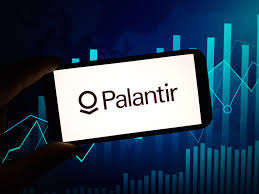Palantir’s Political Ties: Will They Make or Break Its AI Empire?
Palantir Technologies is having a moment. Its stock has been soaring, fueled by the massive hype surrounding artificial intelligence (AI), a steady stream of government contracts, and a growing presence in the commercial world. But is this rapid rise sustainable, or are we looking at another overinflated AI stock that could come crashing down?
To understand what’s happening, let’s break it down—what’s driving Palantir’s success, where it could face trouble, and what the future might hold for this once-shadowy tech giant.
The AI Boom: Palantir Rides the Wave
If there’s one thing investors love right now, it’s AI. The world has been captivated by the rise of artificial intelligence, and companies that position themselves as leaders in the field are seeing their stock prices explode.
Palantir has been quick to capitalize on this. While it was originally known for working with government agencies on defense and intelligence, the company has pivoted hard into AI, rolling out new products that promise to revolutionize everything from business operations to military strategy.
At the core of Palantir’s AI push are Gotham and Foundry, two platforms that use machine learning and data analytics to help organizations make smarter decisions. Gotham, built for government agencies, is used in counterterrorism and intelligence gathering, while Foundry is designed for businesses looking to optimize logistics, financial forecasting, and operations.
Palantir’s latest earnings report showed a 36% jump in revenue, largely driven by a spike in demand for AI-powered data solutions. This has caught the attention of investors who believe AI will reshape industries and make companies like Palantir indispensable.
But AI hype alone isn’t enough. The real question is whether Palantir can turn this excitement into long-term, sustainable growth.
Government Contracts: A Blessing and a Risk
A huge part of Palantir’s success comes from its work with the U.S. government. Over half of its revenue comes from government contracts, with agencies like the Department of Defense and U.S. intelligence services relying on its technology.
This is both a strength and a potential weakness. On one hand, having the government as a major client provides stability—there will always be a need for national security and intelligence technology. But on the other hand, this heavy dependence on government money means that budget cuts, political shifts, or policy changes could pose serious risks.
Recently, reports surfaced about potential cuts in defense spending, which could affect companies like Palantir that rely on military and intelligence contracts. While Palantir has successfully navigated these changes in the past, investors are keeping a close eye on whether the company can diversify beyond government work.
Politics and Controversy: A Double-Edged Sword
Palantir isn’t just another AI company—it’s also deeply tied to political power and controversy.
Co-founder Peter Thiel has long been a vocal supporter of conservative politics, including backing Donald Trump in past elections. This has led to concerns that Palantir’s success is tied to specific administrations and that a shift in political leadership could impact the company’s standing.
Beyond politics, Palantir has also faced criticism over its work with law enforcement, immigration agencies, and military operations. Its technology has been used in predictive policing and border control efforts, raising ethical concerns about surveillance and privacy.
For some investors, these controversies are just noise—after all, governments and corporations will continue to invest in AI-driven intelligence. But for others, they represent a potential reputational risk that could impact Palantir’s ability to attract clients and partners in the future.
Is Palantir Overhyped? What Analysts Are Saying
Right now, there’s a split opinion on whether Palantir’s stock is worth its sky-high valuation.
Some experts believe Palantir is a must-own AI stock. Analysts at Wedbush Securities have called it a top stock for 2025, citing its AI capabilities and deep government ties. They’ve set a $120 price target, predicting even more growth ahead.
But others are skeptical. At its current price, Palantir is trading at over 300 times its earnings—an extremely high multiple that suggests investors are paying for future potential rather than current results. If AI enthusiasm cools down, or if Palantir struggles to expand its commercial business, the stock could be in for a major correction.
The Road Ahead: Can Palantir Keep the Momentum?
Palantir’s future will depend on how well it expands beyond its government roots and proves its AI technology can drive real, lasting value.
Here’s what to watch for in the coming months:
- Expanding Commercial Business – Can Palantir convince more companies outside of the government to use its AI products?
- Navigating Government Shifts – Will changes in defense spending or political leadership impact its contracts?
- AI Competition – Tech giants like Microsoft, Google, and OpenAI are also heavily investing in AI—can Palantir stay ahead?
- Regulatory Challenges – As AI governance tightens, will Palantir face pushback on privacy and data concerns?
While Palantir has built an impressive empire, the company now faces higher expectations than ever. Investors are betting big on its AI potential—but as we’ve seen with many tech stocks in the past, hype can only carry a company so far.
Final Thoughts
Palantir’s stock surge is a fascinating case study in how AI, politics, and government work can shape a company’s future. Right now, the excitement is real, and Palantir is enjoying the benefits of being a key player in the AI revolution.
But staying at the top won’t be easy. The company needs to prove it can sustain its momentum, diversify its revenue, and navigate the tricky waters of politics and regulation.
For now, Palantir is riding high on the AI wave—but whether it’s a long-term winner or just another overhyped stock remains to be seen.







